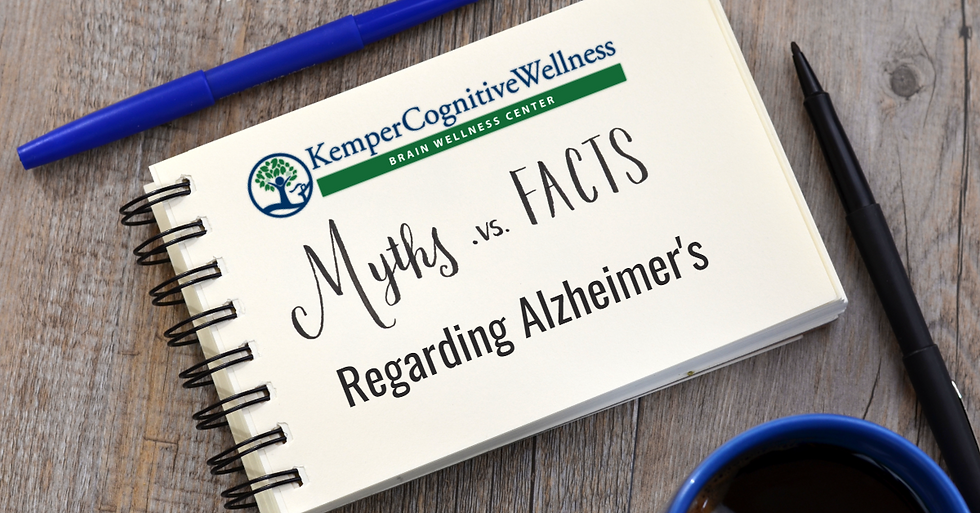Myths & Facts Regarding Alzheimer's
- Kemper Wellness
- Mar 4, 2023
- 3 min read

By: Stephanie Holloway, Kemper Cognitive Wellness
Key Words & Definitions:
Subjective Cognitive Impairment (SCI): the stage of cognitive decline that happens when YOU notice it and possibly those closest to you. Something is “off” with your thinking or memory but it is too early to be picked up by most tests. This stage is different than normal changes of memory and thinking from aging.
Mild Cognitive Impairment (MCI): the stage of cognitive decline that can be measured on tests and is often thought of as Pre-dementia.
Dementia: Not a specific disease but rather a general term for the impaired ability to remember, think, or make decisions to the extent that it interferes with doing everyday activities and the ability to live fully independently.
Alzheimer’s: a form of cognitive impairment. Someone with Alzheimer’s changes in their brain may have SCI, MCI, or full-blown Alzheimer’s dementia. It is the most common form of dementia throughout the world.
APOE4 Gene: The strongest known risk factor gene for Alzheimer’s disease.
Neurobics: Mental & physical exercises designed to stimulate the body and brain together to stimulate neural pathways and improve or maintain brain and body function.
Sleep Hygiene: Habits and practices that are conducive to sleeping well on a regular basis.
Myth: Every senior will experience dementia as they age. It’s part of the normal aging process. The more you age, the more your memory declines.
Fact: There is a fine line between normal aging and the onset of SCI/Subjective Cognitive Impairment or MCI/mild cognitive impairment. As we age, it is common to forget a name, face, or date from time to time. Our brains don’t typically learn or recall new information as easily as they did when we were younger. However, memory loss that gradually worsens and becomes more frequent is not a sign of normal aging. When memory loss or thinking issues interfere with your ability to manage all aspects of your life (e.g. able to drive, clean your house, pay your bills, etc.), this may be an early indicator of dementia.
Myth: If I receive an Alzheimer’s or other related dementia diagnosis, there is nothing that can be done to halt cognitive loss.
Fact: Decline is not inevitable. Although there is no approved cure for Alzheimer’s and related dementias, there are evidence-informed interventions and treatments that, when properly implemented, can halt or diminish cognitive loss and improve brain function. Ask your doctor or the experts at Kemper Cognitive Wellness to help you figure out what the root causes of your cognitive decline might be.
Many of our clients who make some basic lifestyle modifications, such as nutritional adjustments, proper supplementation, participation in neurobics or other specialized programs (such as BrainFittm), and practice good sleep hygiene have been able to improve their brain function, stabilize their cognitive losses, and greatly improve the quality of their (and their family’s) lives.
Myth: If I have a family history of Alzheimer’s and/or carry one or two copies of the APOE4 gene, it is inevitable that I will be diagnosed with dementia.
Fact: A family history or carrying one or two copies of the APOE4 gene does not mean that you will eventually develop Alzheimer’s type dementia, but you may be at greater risk. Our Lifestyle Assessment helps our clients identify the root causes that drive memory loss and can help break the generational cycle of Alzheimer’s. If a person is at risk, the sooner they begin implementing some modifications, the less likely it is that they will experience cognitive loss.
Myth: It’s too hard for seniors to learn new things.
Fact: No one is ever too old to learn a new skill or hobby. Our brains are highly adaptable and malleable. Every time we process new information, our brain cells fire and transmit information to be stored in different areas of the brain. Recent scientific evidence has proven that it may be possible for the brain to move function from one damaged area to a non-damaged area, potentially creating a “work-around” for people with cognitive decline.




Comments